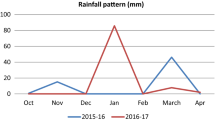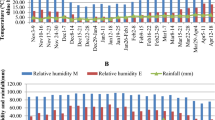Abstract
Background
Wheat is an important cereal crop that helps to meet the food grain needs of people all over the world. Heat stress is one of the most significant abiotic stresses that wheat crops face during terminal growth stages in the wheat growing regions like India. It is very important to identify heat tolerant genotypes to be used as donors for breeding tolerant varieties.
Methods
Thirty-six wheat genotypes were evaluated under different sowing dates viz., Timely sown (TS), Late sown (LS) and very late sown (VLS), and the fourth was sown in the Temperature controlled phenotyping facility (TCPF) across two years. Genotypes were planted following lattice square design with two replications. Data was recorded for yield and yield contributing traits and analysed using selection indices as well AMMI and GGE biplot stability models.
Results
Heat stress affected all the traits under different heat environments which ranged from 1.6% (Spikelet number) to 37.2% (grain yield). Regression analysis indicated that the thousand grains weight (R2 = 0.50) contributed significantly towards grain yield under heat stress. Stress susceptibility index (SSI) found genotypes GW322, RAJ3765, Raj4037and MACS6145 as heat tolerant whereas, Stress Tolerance Index (STI) identified C306, HD2967, WH1080, WH730, DBW90, HD2932, DBW17, RAJ3765 as heat tolerant and high yielding. AMMI biplot analysis indicated stable genotypes DBW90, WH730, RAJ4083, CBW38, HD2932, NI5439, WR544, whereas GGE biplot analysis revealed stable genotypes NIAW34, NI5439, RAJ4083, DBW90, PBW590, Raj3765, HUW 510, WH730, HD2967 and UP2382.
Conclusion
Heat stress affects significantly all yield contributing traits. Thousand grain weight was the most important trait that can be used as a selection criterion for selecting tolerant lines. Based on selection indices and both AMMI and GGE analysis, genotype RAJ3765 was identified to be highly heat tolerant with good grain yield.



Similar content being viewed by others
References
Shewry PR (2009) Wheat J Exp Bot 60:1537–1553
Lobell DB, Schlenker W, Costa-Roberts J (2011) Climate trends and global crop production since 1980. Science 333:616–620
IPCC (2019) Climate change and land: an IPCC special report on cli- mate change, desertification, land degradation, sustainable land management, food security, and greenhouse gas fluxes in terrestrial ecosystems In: Shukla PR, Skea J, Buendía EC (eds) Intergovernmental panel on climate change
Chatrath R, Mishra B, Ortiz –Ferrara G, Singh SK, Joshi AK (2007) Challenges to wheat production in South Asia. Euphytica 157:447–456
Joshi AK, Mishra B, Chatrath R, Ortiz-Ferrara G, Singh RP (2007) Wheat improvement in India: present status, emerging challenges and future prospects. Euphytica 157:431–446
Lobell DB, Bonfils CJ, Kueppers LM, Snyder MA (2008) Irrigation cooling effect on temperature and heat index extremes. Geophys Res Lett 35:L09705
Ni Z, Li H, Zhao Y, Peng H, Hu Z, Xin M, Sun Q (2018) Genetic improvement of heat tolerance in wheat: recent progress in understanding the underlying molecular mechanisms. Crop J 6(1):32–41
Iqbal M, Raja NI, Yasmeen F, Hussain M, Ejaz M, Shah MA (2017) Impacts of heat stress on wheat: a critical review. Adv Crop Sci Tech 5:251–259
Kumar P, Gupta V, Singh G, Singh C, Tyagi BS, Singh GP (2020) Assessment of terminal heat tolerance based on agro-morphological and stress selection indices in wheat Cer Res Commun https://doi.org/10.1007/s42976-020-00112-2
Nahar K, Ahamed KU, Fujita M (2010) Phenological variation and its relation with yield in several wheat (Triticum aestivum L) cultivars under normal and late sowing mediated heat stress condition. Not Sci Biol 2(3):51–56
Stone PJ, Savin R, Wardlaw IF, Nicolas ME (1995) The influence of recovery temperature on the effects of a brief heat shock on wheat: I Grain growth. Aust J Plant Physiol 22:945–954
Ferris R, Ellis R, Wheeler TR, Hadley P (1998) Effect of high temperature stress at anthesis on grain yield and biomass of field grown crops of wheat. Ann Bot 8:631–639
Rane J, Pannu RK, Sohu VS, Saini RS, Mishra B, Shoran J, Crossa J, Vargas M, Joshi AK (2007) Performance of yield and stability of advanced wheat genotypes under heat stress environments of the Indo-Gangetic plains. Crop Sci 4:1561–1573
Dubey R, Pathak H, Chakrabarti B, Singh S, Gupta DK, Harit RC (2020) Impact of terminal heat stress on wheat yield in India and options for adaptation. Agric Sys 181:102826
Misra SC, Varghese P, Eds SS, Singh RR, Hanchinal G, Singh RK, Sharma BS, Tyagi MS, Saharan I, Sharma (2011) Published by Narosa Publishing house Pvt Ltd, pp 105–114
Munns R, James RA (2003) Screening method for salinity tolerance: a case study with tetraploid wheat. Plant Soil 253:201–208
Pandey GC, Mamrutha HM, Tiwari R et al (2015) Physiological traits associated with heat tolerance in bread wheat (Triticum aestivum L.). Physiol Mol Biol Plants. 21(1):93 – 99.
Pandey GC, Mehta G, Sharma P, Sharma V (2019) Terminal heat tolerance in wheat: an overview. J of Cer Res 11(1):1–16
Yan W, Kang MS (2002) GGE-biplot analysis: a graphical tool for breeders, geneticists, and agronomists. CRC Press, Boca Raton, p 288
Ahmadi J, Mohammadi A, Najafi-Mirak T (2012) Targeting promising bread wheat (Triticum aestivum L) lines for cold climate growing environments using AMMI and SREG GGE biplot analyses. J Agric Sci Technol 14:645–657
Kendal E, Sener O (2015) Examination of genotype × environment interactions by GGE biplot analysis in spring durum wheat. Indian J Genet 75:341–348
Vaezi B, Pour-Aboughadareh A, Mohammadi R, Armion M, Mehraban A, Hossein-Pour T, Dorii M (2017) GGE biplot and AMMI Analysis of Barley Yield performance in Iran. Cereal Res Commun 45:500–511
Sharma D, Singh R, Rane J, Gupta VK, Mamrutha HM, Tiwari R (2016) Mapping quantitative trait loci associated with grain filling duration and grain number under terminal heat stress in bread wheat (Triticum aestivum L). Pl Breed 135(5):538–545
Zadoks JC, Chang TT, Konzak CF (1974) A decimal code for the growth stages of cereals. Weed Res 14:415–421
Fernandez GCJ (1992) Effective selection criteria for assessing plant stress tolerance. In: Kuo CG (ed) Adaptation of vegetables and other food crops to temperature water stress, Taiwan. Asian Vegetable Research and Development Center, Tainan, Taiwan, pp 257–270
Fischer RA, Maurer R (1978) Drought resistance in spring wheat cultivars. Part 1: grain yield response. Aust J Agric Res 29:897–912
Zobel RW, Wright MJ, Gauch HG (1988) Statistical analysis of a yield trial. Agron J 80:388–393
Crossa J (1990) Statistical analysis of multi-location trials. Adv Agron 44:55–85
R Core Team (2013) R: A language and environment for statistical computing. R Foundation for Statistical Computing, Vienna, Austria. Available at: http://www.R-project.org/
Zhang Z, Lu C, Xiang ZH (1998) Analysis of variety stability based on AMMI model. Acta Agron Sinica 24:304–309
Yan W, Kang MS, Ma B, Woods S, Cornelius P (2007) GGE biplot vs AMMI analysis of genotype-by-environment data. Crop Sci 47:643–655
Rehman HU, Tariq A, Ashraf I, Ahmed M, Muscolo A, Basra SMA, Reynolds M (2021) Evaluation of physiological and morphological traits for improving spring wheat adaptation to terminal heat stress. Plants 10:455. https://doi.org/10.3390/plants10030455
Khan AA, Kabir MR (2014) Evaluation of spring wheat genotypes (Triticum aestivum L.) for heat stress tolerance using different stress tolerance indices. Cercetări Agron Moldova 4(160):49–63
Singh C, Gupta A, Kumar P et al (2020) Multi-environment analysis of grain yield in a diverse set of bread wheat genotypes. J Cer Res 12(1):29–39
Singh C, Gupta A, Gupta V et al (2019) Genotype x environment interaction analyses of multi- environment wheat trials in India using AMMI and GGE biplot models. Crop Breed Appl Biotech 19:309–318
Prasad I, Kulshreshtha N, Chinchmalatpure AR, Sharma DK (2016) Genetic evaluation and AMMI Analysis for Salinity Tolerance in Diverse Wheat Germplasm. Cereal Res Commun 44:217–228
Elbasyoni IS (2018) Performance and stability of commercial wheat cultivars under terminal heat stress. Agronomy. 8–37
Acknowledgements
The project work was supported by the grants from Indian Council of Agricultural Research, New Delhi to PS (ICAR- LBSOY award F. No. 64-1-17). The authors acknowledge Germplasm Resource Unit of ICAR-IIWBR, Karnal for the supply of seed material. The authors confirm that there are no potential conflicts of interest related to this manuscript.
Author information
Authors and Affiliations
Contributions
PS designed the experiment, GM and PS recorded the field data and VG, RS analysed the data. All the authors contributed to manuscript writing.
Corresponding author
Ethics declarations
Conflict of Interest
The authors declare no conflict of interest.
Ethical approval
This article does not contain any studies with human participants or animals performed by any of the authors.
Additional information
Publisher’s Note
Springer Nature remains neutral with regard to jurisdictional claims in published maps and institutional affiliations.
Electronic supplementary material
Below is the link to the electronic supplementary material.
Rights and permissions
Springer Nature or its licensor (e.g. a society or other partner) holds exclusive rights to this article under a publishing agreement with the author(s) or other rightsholder(s); author self-archiving of the accepted manuscript version of this article is solely governed by the terms of such publishing agreement and applicable law.
About this article
Cite this article
Gupta, V., Mehta, G., Kumar, S. et al. AMMI and GGE biplot analysis of yield under terminal heat tolerance in wheat. Mol Biol Rep 50, 3459–3467 (2023). https://doi.org/10.1007/s11033-023-08298-4
Received:
Accepted:
Published:
Issue Date:
DOI: https://doi.org/10.1007/s11033-023-08298-4




